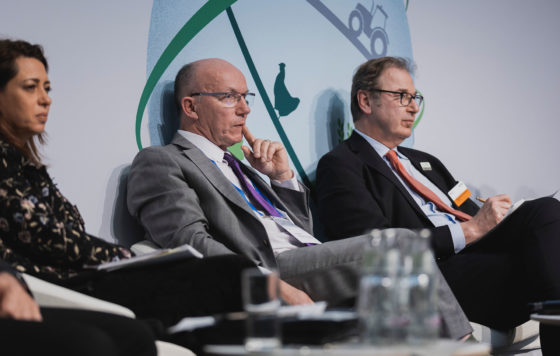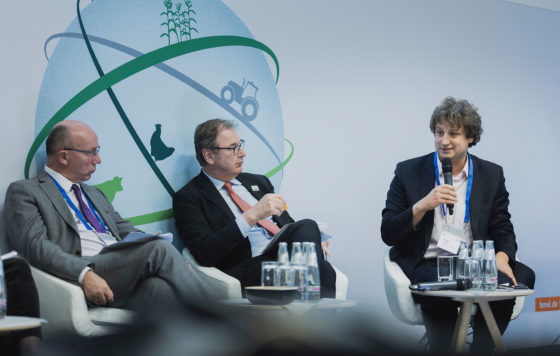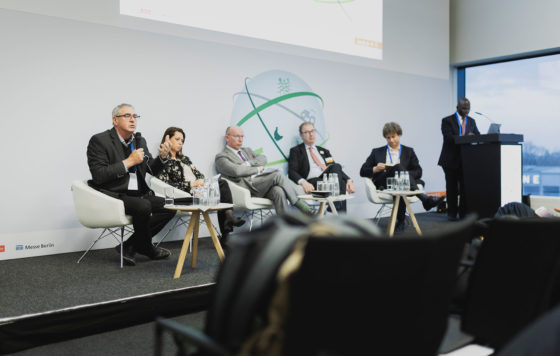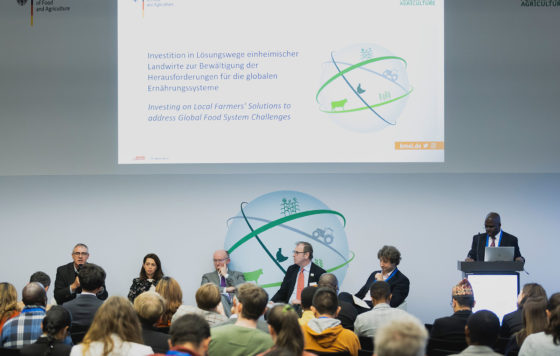Investing on Local Farmers’ Solutions to address Global Food System Challenges
World Farmers’ Organisation (WFO)
Andreas Hermes Academy (AHA)
Time: Thursday, 19. January 2023, 4:00 p.m. – 5:30 p.m.
Room: M4-M5
Languages: English, German, French
Summary:
The panel discussion with high-level participants from WFO, PAFO, AgriCord, World Bank, IFAD and the Food & Land Use Coallition revolved around the critical issue of access to finance for farmers. Backed up by statistical data of the IFAD, the audience learned that only 2% of global climate finance reaches smallholder farmers. However, access to finance is a crucial component for farmers to fulfil their role in changing production means, thus, contributing to a transformation of food systems. Adapting to climate change is and will pose substantial challenges within this transformation as the consequences of a changing climate are unfolding rapidly. Additionally, no blueprint solutions exist but they need to be adapted to the local conditions. Adequate funds to enable this process are crucial.
The panelists agreed that farmers’ organisations are instrumental in building the capacities of their members, a prerequisite for farmers to access funding. Furthermore, only a well-organized agricultural sector, at every level, has the ability to respond to ongoing challenges with the necessary bargaining power.
Another point noted by the panel is the importance of international agreements and a coherent international agenda. However, precisely for those international efforts to be effective at the local level, farmers need to be empowered and involved: Through the representation by farmers’ organisations, they demand to sit at the table.
Panel Guests
The second is as Co-Director of WRI UK, a joint role with Leo Horn-Phathanothai. In this role, Edward is responsible for the care of WRI UK’s 50 staff, its relationship with the UK government, UK-based Board members and other key partners, as well as with WRI’s royal patron, the former Prince of Wales, now King Charles III.
Marcel Groleau’s involvement in the agricultural sector goes well beyond the UPA presidency. He is also president of UPA Développement international and president of Agricord, an organization of 12 agencies that support the development of agricultural organizations in less developed countries. He is also president of the Agricultural and food exception coalition. Mr. Groleau sits on the Executive Committee of the Canadian Federation of Agriculture and on the Advisory Committee of the Canadian Agri-Food Policy Institute. He has participated in numerous missions abroad to follow up on the negotiation of bilateral and multilateral trade agreements and international meetings of agricultural organizations. He also holds a seat on the audit committee of the World Farmers Organization. Mr. Groleau also participated in the advisory committee on the renegotiation of NAFTA.
Mr. Groleau is also a member of the Board of Directors of the Institut de tourisme et d’hôtellerie du Québec (ITHQ) and the Banques alimentaires du Québec.
Mr Puech d’Alissac has always dedicated his life to advocating for the farmers at the national, regional and global levels.
Bureau member of the Fédération national des syndicats d’exploitant agricoles (FNSEA), he represented the European Constituency on the WFO Board from 2017 to 2022, also serving as the Treasurer and Vice President of the Organisation.
He also held the position of President of the European Council of Young Farmers (CEJA) from 1999 to 2001.
His motto is “Tout seul, on va plus vite, ensemble, on va plus loin” (“Alone we go faster, together we go further”).
Before joining IFAD, Triki worked at the African Development Bank (AfDB) as Manager in the Microeconomics, Institutions and Development Impact Division, at its headquarters in Abidjan, Côte d’Ivoire. In that role, she oversaw the screening of all AfDB private sector operations in terms of additionality and development impact.
From 2013 to 2017, she was Chief Country Economist at AfDB North Africa Regional Department based in Tunis, Tunisia where she worked on both private and public sector operations, with a particular focus on entrepreneurship, Public Private Partnerships and financial inclusion/ financial sector development initiatives. She also played a leading role in setting up the AfDB Public Private Partnerships Hub for North Africa and the Souk At-tanmia program promoting youth employment.
From 2008 to 2013 Triki held a senior and then principal economist position at AfDB where she helped set up the Additionality and Development Outcome Assessment (ADOA) team. In this role, she also actively contributed to developing several AfDB flagship programs such as the SME program and the trade finance program, and authored several papers and books on financial inclusion and financial sector development in Africa.
Before joining the AfDB, Triki spent about 10 years in various positions in academia – teaching finance in Canada, France and Tunisia, and managing and consulting with private sector businesses.
Triki holds a PhD in finance (risk management) from HEC Montréal.
Before taking this position, Martien served for two years as Practice Director of the World Bank’s Agriculture Global Practice, where he oversaw the Bank’s agriculture lending, portfolio and analytic work in the East-Asia Pacific, Latin-America and the Caribbean and South Asia Regions, coordinated collaboration with IFC on agribusiness, and led the Bank’s global engagement on agriculture and climate change.
Martien joined the World Bank in 1993 as a Young Professional and worked initially as an agriculture economist in the Latin-America and Caribbean Region. He was cluster leader covering agriculture during field assignments in Madagascar from 2001-2004 and in India from 2005-2007. From 2007 to 2015 Martien worked as Program Coordinator and Sector Manager for Agriculture in various assignments in the Africa Region, including covering Southern and West-Africa. He was also the Practice Manager for Agriculture in the South-Asia Region, a position he held from 2015-2017. Prior to joining the Bank, Martien was an associate scientist in the Economics Program of the International Maize and Wheat Improvement Center in Mexico from 1991-1993 and an associate expert in the Dutch bilateral cooperation program in Pakistan from 1989-1991.
Martien holds a Final (“Doctoraal”) Examination (Cum Laude), Development Economics from Wageningen Agricultural University, Wageningen, The Netherlands and an MBA (Beta-Gamma-Sigma), International Executive Program from Georgetown University, Washington, D.C., USA. He grew up on a family-owned horticulture farm in Gouda, The Netherlands.
Connect with Martien van Nieuwkoop on LinkedIn.
Moderation
Earlier, he was the CEO of African Agribusiness Alliance, Accra, Ghana; former CEO of African Cashew Alliance, Accra, Ghana; a former Executive Director/CEO of African Energy Investment Corporation, AEICORP, Cotonou, Benin Republic and General Manager Banque Internationale du Benin. He served as Deputy Secretary General of the West African Bankers Association (WABA) in Freetown, Sierra Leone.
Dr Oyewole obtained his PhD (Development Finance and Policy) from the University of Bradford, U.K. as a Chevening Scholar; MBA (Marketing and Business Strategy) and Executive Certificate in Financial Institutions for Private Sector Development from the Harvard University, USA in addition to several professional and personal development courses in reputable institutions.
He is a regular resource person and speaker in international conferences and fluent in English and French languages.







